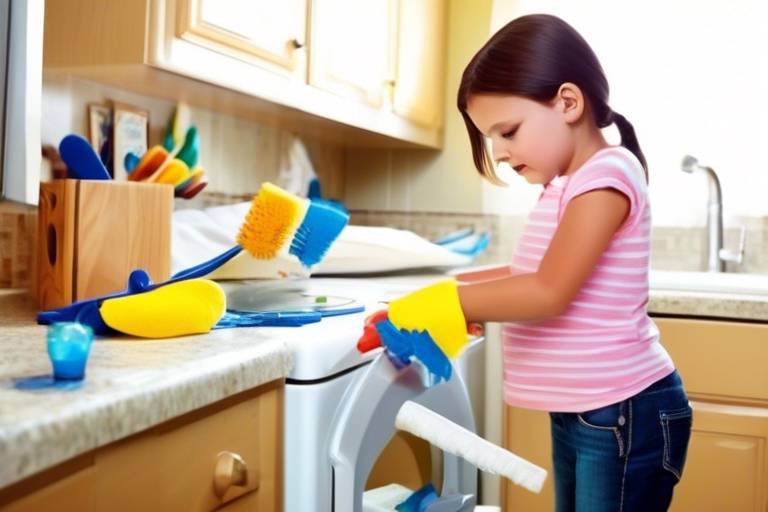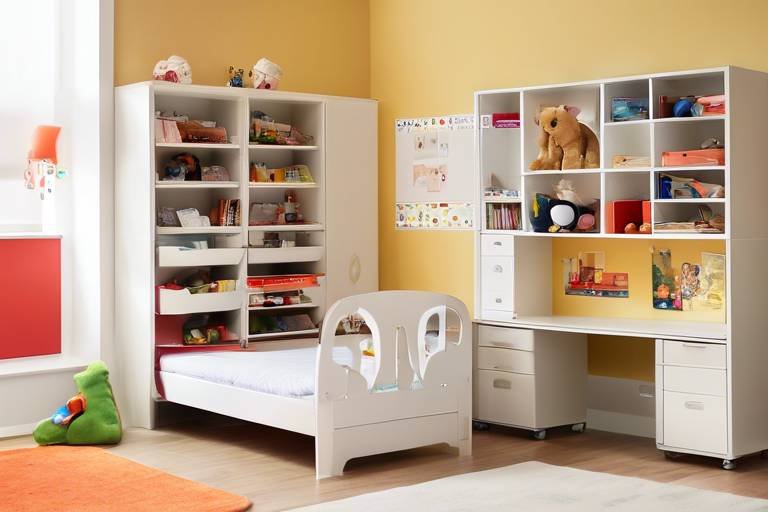The Importance of a Chore List for Kids & Teens
In today's fast-paced world, it can be easy to overlook the little things that contribute to a child's growth and development. One such element that often gets brushed aside is the humble chore list. You might be wondering, "How can a simple list of chores make a difference?" Well, let me tell you, it can be a game changer! A chore list not only fosters responsibility and time management skills in children and teenagers but also plays a significant role in shaping their personal development and enhancing family dynamics. By engaging in household tasks, kids learn vital life skills that will serve them well into adulthood. So, let's dive deeper into the various ways a chore list can empower our young ones.
Imagine a world where children understand the importance of their contributions to the household. A chore list can serve as the perfect tool to instill this sense of responsibility. When kids see their names next to tasks like "take out the trash" or "set the table," they begin to grasp the concept that their actions matter. It’s like planting a seed of responsibility that will grow into a sturdy tree of accountability. By managing tasks and fulfilling their chores, children learn that they are part of a team—one that relies on each member to pull their weight. This realization can lead to a more engaged and responsible individual who takes pride in their contributions.
Have you ever felt overwhelmed by your to-do list? Kids can feel that way too! That's why creating and following a chore list is essential for developing effective time management skills. When children learn to prioritize their tasks, they can balance responsibilities with leisure activities, leading to a more fulfilling life. Think of it as juggling; with practice, they can learn to keep all the balls in the air without dropping any. By organizing chores, kids learn to set priorities, making informed decisions on what tasks to tackle first based on urgency and importance.
Setting priorities is an invaluable skill that extends beyond household chores. When kids categorize their tasks, they begin to understand the difference between what needs immediate attention and what can wait. For example, if they have homework due tomorrow versus a chore that can be completed later in the week, they learn to make choices that reflect their responsibilities. This skill is crucial, as it prepares them for future challenges in school and beyond.
Understanding the difference between daily and weekly chores can help kids plan their schedules more effectively. Daily chores, such as making the bed or washing dishes, are like the building blocks of a well-structured day. Weekly chores, like vacuuming or cleaning the bathroom, can be viewed as the icing on the cake. By recognizing these distinctions, children can allocate their time wisely, ensuring that all tasks are completed on time without feeling overwhelmed.
Life can be unpredictable, and kids need to learn how to adapt. A chore list teaches them flexibility, allowing them to adjust their tasks to accommodate busy schedules. Whether it's a last-minute sports practice or a surprise study session, kids can learn to shift their chores around, teaching them valuable lessons in adaptability and resilience. This ability to manage unexpected changes will serve them well throughout their lives.
One of the most significant benefits of a chore list is that it encourages kids to take initiative and complete tasks independently. This independence fosters a sense of accomplishment and self-sufficiency. When children check off their completed chores, it’s like earning a badge of honor—they feel proud of what they've achieved. This sense of ownership not only boosts their confidence but also prepares them for the responsibilities they'll face as they grow older.
Involving children in household chores can strengthen family bonds as everyone works together toward a common goal. When each family member contributes, it creates a sense of unity and teamwork. Imagine a family cooking dinner together—each person has a role, and the end result is a delicious meal and cherished memories. This collaborative effort promotes communication and understanding within the family unit, leading to a more harmonious home environment.
Assigning chores fosters a sense of shared responsibility, teaching kids the value of collaboration. When children see that everyone in the family has a role to play, they begin to understand the importance of working together. It's like being part of a sports team; each player has their position, and when everyone does their part, the team succeeds. This lesson in teamwork is invaluable, as it prepares them for future collaborations in school, work, and life.
A well-structured chore list can lead to a more organized and positive home environment. When everyone pitches in, it reduces stress and enhances overall family harmony. Imagine walking into a clean, clutter-free home after a long day—it's like a breath of fresh air! A tidy space not only feels good but also fosters a sense of peace and tranquility, allowing family members to focus on what truly matters—spending quality time together.
- What age is appropriate to start a chore list for kids? Generally, children as young as 4 or 5 can begin helping with simple chores, such as picking up toys or putting away shoes.
- How can I motivate my child to complete their chores? Consider using a reward system or positive reinforcement to encourage them. Celebrate their accomplishments, no matter how small!
- Should chores be assigned or chosen by the child? A combination of both can work well. Allowing children to choose some of their chores can give them a sense of control and ownership.

Building Responsibility
This article explores how chore lists can foster responsibility, time management, and life skills in children and teenagers, ultimately contributing to their personal development and family dynamics.
When it comes to instilling a sense of responsibility in kids and teens, a chore list serves as an invaluable tool. Imagine your child stepping up to the plate, ready to tackle their tasks like a mini superhero! By assigning specific chores, you are not just delegating work; you are teaching them the significance of contributing to their household.
Responsibility is more than just a buzzword; it’s a fundamental life skill. When children know that their actions have consequences—like the dishes piling up if they don’t wash them—they start to understand the importance of their role in the family. This realization can be a game-changer. They become more accountable for their actions, leading to a sense of pride when they complete their tasks.
Moreover, a chore list can help kids develop a routine. Routines provide structure, and structure breeds responsibility. When kids see their chores written down, it becomes a visual reminder of what they need to accomplish. It’s like having a personal coach cheering them on, guiding them through their responsibilities.
Let’s not forget the emotional aspect. Completing chores can give children a sense of achievement, boosting their self-esteem. They learn that they can contribute meaningfully to their home, which fosters a strong sense of belonging. When they see the fruits of their labor—like a clean kitchen or a tidy living room—they feel proud, and that pride reinforces their willingness to take on more responsibilities in the future.
In essence, building responsibility through a chore list is not just about getting things done; it’s about nurturing well-rounded individuals who understand the value of hard work and contribution. It’s about teaching them that every small effort counts towards a larger goal, creating a harmonious living environment for everyone.
Creating and following a chore list helps children develop effective time management skills, allowing them to prioritize tasks and balance responsibilities with leisure activities.
By organizing chores, kids learn to set priorities, making informed decisions on what tasks to tackle first based on urgency and importance.
Understanding the difference between daily and weekly chores can help kids plan their schedules more effectively, ensuring that all tasks are completed on time.
Kids can learn to adapt their chore lists to accommodate busy schedules, teaching them flexibility and the ability to manage unexpected changes.
A chore list encourages kids to take initiative and complete tasks independently, fostering a sense of accomplishment and self-sufficiency.
Involving children in household chores can strengthen family bonds as everyone works together, promoting teamwork and communication within the family unit.
Assigning chores fosters a sense of shared responsibility, teaching kids the value of collaboration and the importance of contributing to a common goal.
A well-structured chore list can lead to a more organized and positive home environment, reducing stress and enhancing overall family harmony.
- How do I create a chore list for my kids? Start by discussing with your children what chores they can handle. Make a list together and assign tasks based on their age and abilities.
- What age is appropriate to start chores? Children as young as three can start with simple tasks like putting away toys. As they grow, you can gradually increase the complexity of their chores.
- How do I motivate my kids to complete their chores? Use positive reinforcement, such as praise or a reward system, to encourage them. Make it fun by turning chores into a game or a family challenge!
- Can chore lists help with time management? Absolutely! Chore lists teach kids how to prioritize tasks and manage their time effectively, balancing responsibilities with leisure activities.

Time Management Skills
Time management is a crucial skill that every child and teenager needs to master as they grow. A well-structured chore list acts as a practical guide, helping them to effectively allocate their time between responsibilities and leisure. Imagine this: your child comes home from school, and instead of diving straight into video games or scrolling through social media, they glance at their chore list and start with the most urgent task. This simple act of prioritization not only keeps the house running smoothly but also teaches them the invaluable lesson of managing their time wisely.
When kids learn to follow a chore list, they begin to understand the concept of deadlines. They realize that some tasks need to be completed sooner rather than later, which is a fantastic way to introduce them to the idea of urgency. For instance, if they have a chore that needs to be done daily, like taking out the trash, they learn that if they wait until the last minute, it might become overwhelming. This fosters a sense of accountability, as they start to recognize the consequences of procrastination.
Moreover, organizing chores into daily and weekly tasks can significantly enhance their planning skills. By distinguishing between what needs to be done every day versus what can wait until the weekend, children can create a more effective schedule. For example, daily chores might include making their bed, while weekly chores could involve vacuuming the living room. This structure allows them to visualize their week and helps them to allocate time for homework, playtime, and other activities. It’s like creating a roadmap for their days—one that leads to both productivity and fun!
Another essential aspect of time management is learning to adjust for busy schedules. Life is unpredictable, and kids will encounter situations where they need to adapt their chore list. Perhaps a surprise school project comes up, or they have a last-minute playdate. By teaching them to be flexible and adjust their chores accordingly, you’re equipping them with the ability to handle unexpected changes gracefully. This skill is invaluable as they transition into adulthood, where juggling work, personal life, and family commitments becomes a daily reality.
In summary, a chore list is not just a tool for keeping the house tidy; it’s a powerful instrument for teaching children and teens how to manage their time effectively. By fostering these skills early on, you’re setting them up for success, helping them to balance responsibilities with leisure, and ultimately guiding them toward becoming more organized and responsible individuals.

Setting Priorities
When it comes to managing chores, can be a game-changer for kids and teens. Imagine standing in front of a mountain of tasks, feeling overwhelmed and unsure where to start. That's where a well-organized chore list steps in, acting like a trusty map guiding them through the jungle of responsibilities. By helping children learn to identify which chores are urgent and which can wait, we equip them with a vital life skill that extends far beyond household tasks.
To help kids grasp the concept of prioritization, it's important to introduce them to the idea of urgency versus importance. For instance, a spilled drink might need immediate attention, while organizing their room can be scheduled for later in the week. This distinction encourages them to think critically about their tasks. A simple way to visualize this is by using a four-quadrant grid:
| Urgent | Not Urgent | |
|---|---|---|
| Important | 1. Clean up a mess | 1. Organize books |
| Not Important | 2. Sort laundry | 2. Dust the shelves |
This grid not only helps kids visualize their tasks but also encourages them to make informed decisions about what to tackle first. By categorizing chores, they can see that some tasks demand immediate action, while others can be planned for later in the week. This kind of strategic thinking is essential, especially as they grow older and face more complex responsibilities in school and eventually the workplace.
Moreover, teaching kids to set priorities also fosters a sense of ownership and accountability. When they choose which tasks to complete first, they feel more in control of their environment. This sense of autonomy can be incredibly empowering, transforming chores from a mundane obligation into a personal challenge. After all, who doesn’t love the satisfaction of crossing off a completed task from their list?
As they navigate their chore lists, kids also learn the importance of flexibility. Life is unpredictable, and sometimes plans change. By encouraging them to reassess their priorities regularly, they can adapt to new circumstances—be it a surprise visit from a friend or a last-minute homework assignment. This adaptability is a crucial skill that will serve them well throughout their lives.
In conclusion, setting priorities is not just about getting chores done; it's about teaching kids valuable life lessons. By guiding them through the process of identifying urgent tasks, categorizing responsibilities, and adapting to changes, we prepare them for a future where they can manage their time effectively and make sound decisions. So, the next time you hand your child a chore list, remind them that it’s not just a list of tasks—it's a stepping stone to developing their time management and decision-making skills.
- Why are chore lists important for kids? Chore lists help kids develop responsibility, time management skills, and independence, all of which contribute to their personal growth.
- How can I encourage my child to stick to their chore list? Make it fun! Use charts, rewards, or family discussions to engage them and motivate them to complete their tasks.
- What age is appropriate to start using chore lists? You can start introducing chore lists as early as age 4 or 5, tailoring the complexity of tasks to their developmental stage.
- How can chore lists improve family dynamics? By involving everyone in household tasks, chore lists foster teamwork and communication, leading to a more harmonious family environment.

Daily vs. Weekly Chores
When it comes to managing household tasks, understanding the difference between daily and weekly chores is crucial for kids and teens. This distinction not only helps them plan their time better but also ensures that they grasp the rhythm of household responsibilities. Daily chores are typically the tasks that need to be done every day, such as making the bed, washing dishes, or taking out the trash. These tasks help maintain a clean and organized living space and instill a sense of routine in young minds.
On the other hand, weekly chores are those that can be scheduled for a specific day or time during the week, such as vacuuming the living room, cleaning the bathroom, or doing laundry. By categorizing chores in this way, kids can learn to manage their time more effectively. For example, they might tackle daily chores after school, while setting aside a weekend day for larger tasks. This not only prevents overwhelming feelings but also allows them to enjoy their leisure activities without the nagging thought of unfinished chores looming over their heads.
To illustrate this further, let’s take a look at a simple table that outlines some common daily and weekly chores:
| Daily Chores | Weekly Chores |
|---|---|
| Make the bed | Vacuum the house |
| Wash dishes | Clean the bathroom |
| Feed pets | Do laundry |
| Take out the trash | Dust furniture |
By recognizing these differences, children not only become more adept at managing their time but also learn the importance of consistency. Daily chores help build habits, while weekly chores offer a chance to reflect on what has been accomplished over the week. This reflection is vital for personal growth, as it encourages kids to take pride in their contributions to the household.
Additionally, kids can learn to adjust their chore lists based on their schedules. For instance, if they have a busy week ahead with school projects or extracurricular activities, they might choose to tackle lighter daily chores and postpone some of the weekly tasks. This flexibility teaches them that life can be unpredictable, and adapting to changes is a valuable skill. Ultimately, understanding the balance between daily and weekly chores not only fosters a sense of responsibility but also contributes to a more harmonious family environment.
- Why are chore lists important for kids? Chore lists help instill responsibility, improve time management skills, and encourage independence.
- How can I motivate my child to complete their chores? Use positive reinforcement, set clear expectations, and involve them in the creation of the chore list.
- What are some effective ways to organize a chore list? Consider using a chart or app, categorize chores by daily and weekly tasks, and allow your child to choose which chores they prefer.
- How can I adjust chores for busy weeks? Encourage your child to prioritize tasks and modify their chore list based on their schedule, focusing on essential tasks first.

Adjusting for Busy Schedules
Life can often feel like a whirlwind, especially for kids and teens juggling school, extracurricular activities, and social lives. Adjusting a chore list to fit into these busy schedules is not just a practical necessity; it's a valuable lesson in flexibility and adaptability. Imagine trying to fit a square peg into a round hole; without adjustments, it just won’t work! By teaching children how to modify their chores based on their day-to-day commitments, we equip them with skills that will serve them well into adulthood.
One effective way to approach this is by encouraging kids to assess their weekly commitments. They can start by creating a simple chart that outlines their activities, which could look something like this:
| Day | Activities | Chores |
|---|---|---|
| Monday | Soccer Practice | Make Bed, Clear Dishes |
| Tuesday | Homework | Vacuum Living Room |
| Wednesday | Music Lessons | Take Out Trash |
| Thursday | Study Group | Water Plants |
| Friday | Movie Night | Clean Room |
This table helps kids visualize their week, making it easier to see where they can fit in their chores. Additionally, they can use a simple color-coding system to highlight busy days versus lighter days. For example, they could mark busy days in red and lighter days in green. This visual cue can help them quickly identify when they can tackle more chores or when they might need to defer some tasks.
Moreover, it's crucial to teach kids the importance of communication. If they know they have a packed schedule, they should feel comfortable discussing it with parents or guardians. This way, they can negotiate which chores can be postponed or how they can rearrange their list to accommodate their busy lives. This not only helps them manage their responsibilities but also fosters a sense of teamwork within the family.
Ultimately, the goal is to help children understand that life is dynamic. Just like a river that flows and changes course, their schedules will ebb and flow. By mastering the art of adjusting their chore lists, they learn that it’s perfectly okay to adapt to new circumstances. This skill will not only help them in managing household chores but will also be invaluable in their future endeavors, whether in academics or their careers.

Encouraging Independence
One of the most significant benefits of implementing a chore list for kids and teens is the way it encourages independence. Imagine a young bird taking its first flight; it’s a little scary but exhilarating at the same time. Similarly, when children are given the responsibility of completing chores on their own, they experience a sense of freedom and accomplishment. This independence is crucial for their personal development as it allows them to explore their capabilities and build confidence in their abilities.
When kids take the initiative to complete tasks without being prompted, they learn valuable life skills. For instance, they begin to understand the importance of planning and executing tasks effectively. This can be as simple as organizing their laundry day or ensuring that their homework is done before playtime. By managing their chores, they not only contribute to the household but also gain a sense of ownership over their responsibilities.
Furthermore, the act of crossing items off their chore list can be incredibly satisfying. It’s like checking off a bucket list item; each completed task adds to their sense of achievement. This can be particularly motivating for children, as they see the tangible results of their efforts. In doing so, they learn that hard work yields rewards, reinforcing the idea that they can accomplish tasks independently.
Moreover, fostering independence through chores teaches kids how to deal with challenges. Life is full of unexpected twists and turns, and having the ability to adapt is essential. For example, if a child has a busy week ahead with school projects and social events, they’ll need to prioritize their chores accordingly. This experience not only enhances their problem-solving skills but also instills a sense of flexibility. They learn that while plans may change, they can still find a way to manage their responsibilities effectively.
Ultimately, encouraging independence through a chore list is not just about keeping the house tidy; it's about preparing children for the future. It equips them with the skills they need to navigate adulthood. As they grow, they will carry these lessons with them, understanding that they are capable of managing their lives and contributing to their communities. So, the next time you hand your child a chore list, remember that you’re not just assigning tasks; you’re giving them the gift of independence.
- Why should I create a chore list for my child? A chore list helps children develop responsibility, time management, and independence, all of which are essential life skills.
- At what age should I start using chore lists? You can start introducing chore lists as early as preschool age, adjusting tasks according to their abilities.
- How can I make chore lists more appealing? Consider using colorful charts or fun stickers to track progress, making the experience more engaging for your child.
- What if my child resists doing chores? It’s important to communicate the value of chores and involve them in the process of creating the list to foster a sense of ownership.

Enhancing Family Dynamics
In today’s fast-paced world, it’s easy for families to drift apart, caught up in the whirlwind of individual schedules and responsibilities. However, involving children in household chores can significantly enhance family dynamics. When everyone pitches in, it becomes less about the tasks at hand and more about the shared experiences that come from working together. This collaboration fosters a sense of unity and belonging, reminding each family member that they are part of a team.
Think about it: when you and your kids tackle chores side by side, you create opportunities for conversation and bonding. Whether it’s folding laundry, washing dishes, or tidying up the living room, these moments can transform mundane tasks into valuable family time. This is where teamwork comes into play. When children see their parents actively participating in chores, they learn the importance of collaboration and how working together can make even the most tedious tasks enjoyable.
Moreover, assigning chores helps children understand the concept of shared responsibilities. It teaches them that everyone has a role to play in maintaining a harmonious home. For instance, if one child is responsible for taking out the trash while another is in charge of setting the table, they learn to appreciate each other's contributions. This not only builds respect but also instills a sense of accountability. They begin to realize that their actions impact the family unit as a whole, fostering a deeper sense of connection.
Additionally, a well-structured chore list can lead to a more organized and positive home environment. When everyone knows what they need to do, it reduces confusion and stress. Imagine coming home to a clean kitchen or a tidy living room because everyone has done their part. It creates an atmosphere of peace and order, which is essential for family harmony. Children and teens feel more at ease in a space that reflects teamwork and cooperation.
To further illustrate the benefits of involving children in chores, consider the following table:
| Benefit | Description |
|---|---|
| Strengthened Bonds | Working together on chores enhances communication and understanding among family members. |
| Life Skills Development | Children learn important skills such as time management, organization, and responsibility. |
| Positive Home Environment | A clean and organized home reduces stress and promotes a sense of well-being. |
| Shared Accomplishments | Completing chores together creates a sense of achievement and pride in the family. |
Ultimately, enhancing family dynamics through chores is about creating a positive and cooperative environment. It’s about teaching kids that contributing to the family is not just a duty but a way to show love and respect. So, the next time you’re tempted to tackle a household task alone, consider inviting your kids to join you. You might just find that the laughter and conversation that ensue make the chore feel less like work and more like a cherished family ritual.
- Why should I involve my kids in chores? Involving kids in chores teaches them responsibility, life skills, and the value of teamwork.
- At what age can children start doing chores? Children can start helping with simple tasks as early as 3 or 4 years old, gradually taking on more complex chores as they grow.
- How can I motivate my kids to do chores? Use positive reinforcement, set clear expectations, and make chores fun by turning them into games or challenges.
- What if my child refuses to do chores? It’s important to have open communication. Discuss their concerns and find a compromise that works for both of you.

Shared Responsibilities
When it comes to household chores, the concept of is like a well-tuned orchestra. Each family member plays their part, contributing to the overall harmony of the home. By assigning chores, parents can teach their children the invaluable lesson of collaboration. Imagine a family where everyone pitches in—it's not just about getting the work done; it’s about building a sense of community within the household. When kids understand that they are part of a team, they learn to appreciate the efforts of others and recognize the importance of working together towards a common goal.
Shared responsibilities can also help children develop essential life skills. For instance, when they take part in cooking, cleaning, or organizing, they are not only learning how to manage a household but also gaining confidence in their abilities. This process encourages them to communicate effectively with their siblings and parents, fostering a supportive environment where everyone feels valued. How often do we see families struggling with chores? By distributing tasks evenly, the burden is lifted, and each member feels empowered to contribute, making the home a much more pleasant place to be.
Moreover, assigning chores can lead to some friendly competition. When siblings are given similar tasks, they may naturally want to outdo each other, which can make the chores feel less like a chore and more like a game. This can be especially effective in motivating kids to finish their tasks promptly. To illustrate this, consider a simple chore chart:
| Family Member | Chore | Completion Status |
|---|---|---|
| Emily | Vacuum Living Room | ✅ |
| Jack | Wash Dishes | ❌ |
| Sophia | Take Out Trash | ✅ |
In this example, each family member has a designated chore, and the completion status helps track progress. This not only promotes accountability but also encourages a friendly spirit of competition. The more chores completed, the more points or rewards can be given. This gamification of chores can transform mundane tasks into exciting challenges, making everyone eager to contribute.
Ultimately, shared responsibilities within the household are crucial for teaching children about teamwork, accountability, and the importance of contributing to the family unit. As they grow older, these lessons will stick with them, shaping them into responsible adults who understand the value of collaboration in all aspects of life. So, why not start today? Get the whole family involved and watch as your home transforms into a place of shared joy, responsibility, and teamwork!
- Why are shared responsibilities important for kids?
Shared responsibilities teach children the value of teamwork, accountability, and the importance of contributing to family life.
- How can I motivate my kids to complete their chores?
Using a chore chart, setting up a reward system, or turning chores into a game can motivate kids to complete their tasks.
- What age should kids start doing chores?
Children can begin helping with simple tasks as early as 3 or 4 years old, gradually taking on more responsibilities as they grow.
- How do shared responsibilities affect family dynamics?
They enhance communication, strengthen relationships, and create a sense of unity and shared purpose within the family.

Creating a Positive Environment
When you think about a positive home environment, what comes to mind? Is it a space filled with laughter, cooperation, and a sense of belonging? One of the most effective ways to cultivate this atmosphere is by implementing a chore list for kids and teens. Not only does it help in keeping the household organized, but it also promotes a sense of ownership and responsibility among family members.
Imagine walking into a home where everyone knows their roles and responsibilities. The chaos of clutter is replaced with a sense of order, and the air is filled with a collaborative spirit. When children participate in household chores, they become active contributors rather than passive observers. This shift in dynamics can lead to a more harmonious living space where everyone feels valued and respected.
Moreover, a structured chore list can significantly reduce stress levels within the family. When tasks are clearly defined, there’s less room for confusion and frustration. Family members can avoid the dreaded last-minute rush to complete chores before guests arrive or before heading out for a family outing. Instead, everyone can approach their responsibilities with a sense of calm, knowing exactly what needs to be done and when.
To illustrate this point, let’s consider the impact of teamwork on family dynamics. When chores are assigned and completed collectively, it fosters a sense of camaraderie. Families can even turn chores into fun activities—think of washing the car together while blasting your favorite tunes or cooking dinner as a team. These moments not only make chores more enjoyable but also strengthen family bonds. Here’s how:
- Collaboration: Working together on chores teaches kids the importance of teamwork.
- Communication: Discussing who does what encourages open dialogue and helps resolve conflicts.
- Shared Achievements: Completing tasks together creates a sense of accomplishment that everyone can celebrate.
In conclusion, creating a positive environment through chore lists goes beyond just maintaining cleanliness. It instills values of teamwork, responsibility, and respect in children, shaping them into well-rounded individuals. So, the next time you consider starting a chore list, remember that you’re not just organizing your home; you’re also nurturing a family dynamic that thrives on collaboration and positivity.
- Why should I create a chore list for my kids?
A chore list helps instill responsibility and time management skills in children while promoting a sense of teamwork within the family. - What age is appropriate to start a chore list?
Children as young as 3-4 years old can begin with simple tasks, while older children and teens can handle more complex chores. - How can I make chores more enjoyable for my kids?
Turn chores into games, play music, or offer rewards for completing tasks to make the experience fun and engaging. - What should I do if my child refuses to do their chores?
Have an open conversation about the importance of contributing to the household and consider modifying the chore list to better suit their interests.
Frequently Asked Questions
- Why should I create a chore list for my kids?
Creating a chore list for your kids is a fantastic way to instill a sense of responsibility. It teaches them that contributing to the household is important, helping them understand their role in the family. Plus, it’s a fun way to engage them in daily activities!
- What age is appropriate to start a chore list?
You can start a chore list as early as age 3! At this age, kids can help with simple tasks like putting away toys. As they grow older, you can increase the complexity of their chores, allowing them to take on more responsibilities.
- How can a chore list improve my child's time management skills?
A chore list helps children learn to prioritize tasks effectively. By organizing chores into daily and weekly categories, they can balance their responsibilities with leisure activities. It’s like giving them a roadmap to navigate their time!
- What if my child has a busy schedule?
Flexibility is key! Encourage your child to adjust their chore list to accommodate their busy days. This adaptability teaches them how to manage unexpected changes and maintain a balanced life.
- How can chores enhance family dynamics?
When everyone pitches in, it creates a sense of teamwork and collaboration. Completing chores together can strengthen family bonds, promoting communication and a shared sense of accomplishment.
- What are some examples of age-appropriate chores?
Here’s a quick list to get you started:
- Age 3-5: Putting away toys, sorting laundry
- Age 6-8: Setting the table, feeding pets
- Age 9-12: Vacuuming, washing dishes
- Age 13+: Doing laundry, cooking simple meals
- How can I motivate my kids to complete their chores?
Make it fun! You can turn chores into a game or challenge, offer rewards for completed tasks, or even create a family chore chart. Positive reinforcement goes a long way in keeping kids motivated!
- What should I do if my child refuses to do their chores?
First, have a conversation about why they’re reluctant. Sometimes, kids may feel overwhelmed or unsure about how to do a task. Offer guidance and support, and if needed, adjust the chore list to make it more manageable.



















